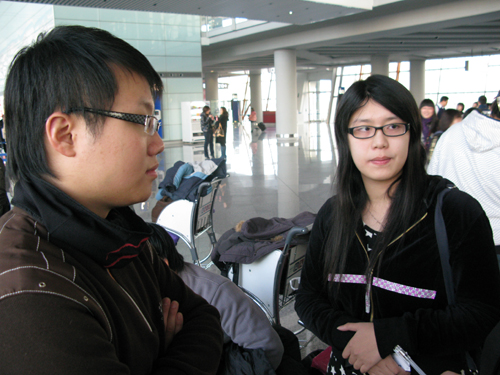Web Exclusive
Wearing down coats, Macao teenagers fond of Beijing
By Zhang Jin (chinadaily.com.cn)
Updated: 2009-12-17 23:58
 |
Large Medium Small |
|
 |
|
Jesse Ng (left) and Yvonne Sun, two high school students from Macao, share their joy at Beijing Capital International Airport on Thursday after a six-day tour to the Chinese capital.[Dong Wei] |
It would be awful to tour Beijing in an unusually cold winter like this.
Indeed, Yvonne Sun had to wear a thick down jacket - the first time in her life - to visit the Great Wall and Forbidden City.
But the 18-year-old from Macao, where temperature hits around 10 C at the lowest, said all pains pay off.
“I was warm at heart,” she said at the Beijing Capital International Airport. “I was thrilled to see the mighty wall … I don’t know why they built it … It’s just an art of god.”
The high school student said these before she boarded a plane that would take her and 40 schoolmates home after six days of their graduation tour in the Chinese capital.
Other than the wall, snacks in Wangfujing, the busiest street in downtown Beijing, were the most impressive to Sun. Indeed, they burned a hole in her wallet.
“I cannot help buying. Everything is new to me,” she said and showed off her bags that were packed with barbecued scorpions, ludagun (glutinous rice rolls with sweet bean flour) and sesame seed cakes.
More than sightseeing and shopping, the trip appeared to be helpful to their academic life. It aroused many students’ interest to pursue further studies in Beijing.
A student who only gave her given name, Agapanthus, said she wished to study civil engineering at Tsinghua University.
“If I can be part of Tsinghua, I will become one of President Hu Jintao’s alumni,” she said with a smile. “That sounds awesome.”
But a few said it is just a passing thought for them to go to top Beijing universities.
“I can hardly pass the examination,” said Jesse Ng, 19. “Only the best of the best can survive the test. But still, I hope I can be the lucky dog.”
However, Beijing is not all good.
Sun says she felt frustrated whenever their tour car ran into traffic congestions.
“We cannot move and have to wait. There is nothing you can do,” she said. "I do hope this can be improved soon.”
Agapanthus said probably more subway lines are needed. “Eight are far from enough for a city of this size.” In fact, Beijing has nine subway lines, with the latest one opening in September.
Having been away from home for nearly a week, some teenagers are a bit homesick.
Macao is small, they say, but small can be equally beautiful.
“The city is tranquil and less rush,” Sun said. “I always felt relaxed, a feeling you can hardly acquire in a metropolis like Beijing.”
Soon after they get home, Macao will celebrate the 10th anniversary of its return to the motherland, which falls on Sunday.
Though these students were too young to remember everything about the Portuguese rule of Macao, which ended in 1999, they say enormous changes took place in the past decade.
“What impresses me is that the security turns good in the city,” said a student, who did not give her name.
Living in the northern part of Macao, the student said there was a time when gangsters, armed with choppers and iron rods, fought in an alley. “Police arrived only when mobsters scrambled away,” she recalled.
Macao had been notorious for rampant gang and violent crimes. Outlaws fought to operate illegal gambling dens and levy on small businesses.
With a population of half a million, Macao was under Portuguese rule for four centuries. The Chinese government resumed its sovereignty over the enclave, the only Chinese place where gambling is legal.
On Sunday, Chui Sai-on will swear in to succeed outgoing Macao Chief Executive Edmund Ho Hau-wah, who has served 10 years. And these students have a piece of advice for the incoming Macao leader.
“The new government should expedite the construction of public flats and make them really affordable to the elderly and poor,” Ng said.
Macao’s property prices more doubled in the past decade, after a gambling and tourism boom boosted the demand of land.
But “most residents earn about 10,000 patacas ($1,300) a month, far from enough to afford a flat that costs millions,” Sun said.







